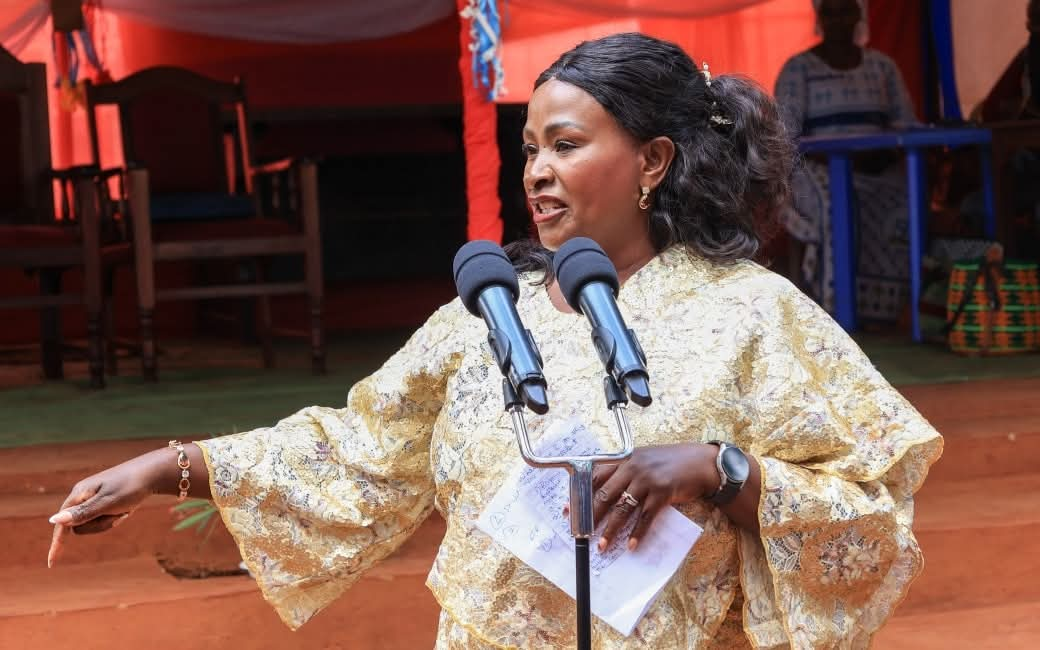 Charity Mueni Ndivo shows Soo TV her seed bank in Kayata, Kilome Constituency. Photo Andrew Mbuva
Charity Mueni Ndivo shows Soo TV her seed bank in Kayata, Kilome Constituency. Photo Andrew Mbuva
By Andrew Mbuva
As the rains become increasingly erratic and climate change continues to rattle Kenya’s food security, a quiet but powerful revolution is unfolding in Makueni County.
In Kayata, Kilome Constituency, smallholder farmers are turning back to indigenous crops—yellow maize, red maize, mung beans, sorghum, and resilient bean varieties—to withstand the harsh semi-arid conditions.
At the heart of this transformation is a community seed bank run by one woman, whose ingenuity is keeping hope alive for her neighbors.
Charity Mueni Ndivo, a farmer and seed saver, has built what locals now call “the village seed bank.” But unlike conventional seed stores, hers is unique—indigenous seeds preserved in liquor bottles.
Over time, she has established a sizeable reserve that now sustains not just her household but also dozens of farming families across the region.
“In my seed bank I have traditional sorghum known locally as Katumîla, finger millet, pearl millet, several bean varieties such as katumbuka, Mwei Umwe, rosecoco and Nyayo,” she explains proudly. “I also keep pumpkin and bottle gourd seeds. Farmers are free to walk in, choose what they need and either buy or return double after harvest.”
A kilo goes for Sh1,000, but Charity’s model is flexible. “For those without money, I give the seeds on condition that after harvest, they return twice the amount. This way the seed bank sustains itself and no farmer is left behind,” she says.
Her inspiration comes from a fading tradition. “Our grandmothers were food secure because they preserved their best seeds in gourds and granaries,” she recalls. “Back then, they knew the right seeds for the right seasons and could even predict rainfall patterns. Today, the climate has changed so much that we can no longer rely on predictions, which makes seed storage even more critical.”
The resilience of indigenous crops is part of their appeal. “These traditional seeds mature quickly, require very little rain, and are resistant to pests and diseases,” Charity says. “That makes them ideal for arid and semi-arid regions like ours.”
Experts say this return to traditional farming is not just about survival but about building a healthier and more sustainable future.
Ngunjiri Kihoro, head of Participatory Ecological Land Use Management (PELLUM), an organization promoting climate-smart agriculture in Ukambani and the Coast, says indigenous seed saving is restoring both nutrition and dignity to farmers.
“The aim is to change what we eat and return to healthy foods,” says Kihoro. “In this region, we encourage farmers to grow cassava, millet and other drought-resistant crops. That way, they are assured of harvests even with minimal rainfall.”
He believes Ukambani could become a vital food basket if current efforts are scaled up.
“The soils here are still very fertile because they haven’t been spoiled by excessive chemicals. Combined with favorable temperatures, crops mature quickly even with little rain. If farmers adopt the right seeds, this region could soon feed much of the country,” he notes.
Back in Kayata, Charity remains convinced that the future lies in preserving the past.
“When rains come, we are never caught unawares. We don’t have to wait for government relief seed distributions,” she says. “By storing and sharing our traditional seeds, we are not just feeding ourselves—we are protecting our future.”